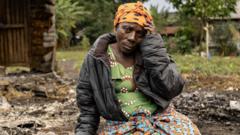In Brazil's northern Para state, women like Dayane Leite turn to sex work in the dangerous environment of illegal gold mines, driven by financial necessity and the grim realities of life in mining settlements. With precarious living conditions, rampant violence, and exploitation, the path to survival is fraught with peril as they seek to provide for their children amidst lawlessness and injustice.
Struggles of Women in Brazil's Illegal Gold Mines: Sex Work and Survival

Struggles of Women in Brazil's Illegal Gold Mines: Sex Work and Survival
Amidst the perils of illegal gold mining in the Brazilian Amazon, women navigate harsh realities, resorting to sex work to support their families.
In the heart of Brazil's northern Para state, the illegal gold-mining trade has created a dire situation for many women, compelling them to turn to sex work as a means of survival. Dayane Leite, now a mother of three, never envisioned a future in this line of work, but after losing her husband at a young age, she was left with no choice but to seek help from miners to fund his funeral. “Going to the mines is a roll of the dice,” she reflects on the harsh realities these women face, often enduring severe humiliation and violence.
Life in the mining settlements can be brutal. Basic amenities are non-existent, and the environment is rife with danger. Although not all women in their city resort to sex work, Natalia Cavalcante, who transitioned from a sex worker to a brothel owner, insists that it's a common practice in Itaituba. "We don’t really care," she says, a sentiment echoed by many women for whom such choices have become normalized as they navigate a world fraught with risk.
Despite the illegality of running a brothel under Brazilian law, Natalia claims she managed the establishment without collecting commissions. By helping young women support their families, she often becomes an intermediary, connecting them with miners eager to spend their gold finds. Yet, the repercussions of these actions are alarming, with reports of extreme violence, sexual exploitation, and murder of women in these mining villages underscoring the dangerous path they tread.
The Brazilian government estimates that between 80,000 and 800,000 men are involved in illegal mining operations, and while efforts are underway to shut down these mines, profit motives keep drawing men into this perilous line of work. With a landscape of 220,000 hectares dedicated to such operations, the human cost remains largely ignored, with many stories of harrowing violence and tragedy stemming from the mining lifestyle, as illustrated by the heartbreaking case of Raiele Santos, who lost her life after rebuffing a man’s advances.
For women like Dayane and Natalia, the stakes are high. Their dreams may revolve around creating a better life for their children — Dayane hopes to open a snack bar — but this often hinges on their ability to endure the grueling cycles of work in dangerous environments. “I will keep trying, until I can’t anymore,” Dayane says, driven by the hope that her sacrifices will inspire pride in her children. As more women enter this illicit economy, it becomes clear that the intersection of survival and exploitation continues to shape the narratives of those living in Brazil's illegal gold mining regions.






















